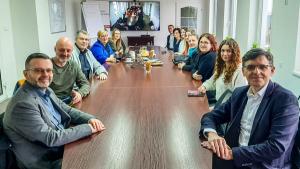On Wednesday, February 7th 2024, a group of scientists from Poland, the Czech Republic, and Slovakia had the opportunity to visit the Orion manufacturing plant of the Selena Group in Nowa Ruda. This visit was part of our Visegrad project "Improving quality management teaching in the era of Industry 4.0". The project is co-financed by the Governments of Czechia, Hungary, Poland and Slovakia through Visegrad Grants from International Visegrad Fund.
During the visit, hosted by Iwona Koptewicz, Barbara Dubiłowicz-Butkiewicz, and Marek Bielas, the researchers gained valuable insights into how Selena Group is embracing Industry 4.0 principles to achieve greater efficiency and quality control. They witnessed firsthand the implementation of:
- Robotization and automation processes: This included impressive demonstrations of how robots are used in production tasks, contributing to smoother operations and a more streamlined workflow.
- Integrated production systems: The researchers learned about the company's interconnected network of production lines, ensuring better coordination and data flow across the entire manufacturing process.
- PRINT project: A highlight of the visit was the showcase of the PRINT project, which digitizes label design and printing, automates order handling, and utilizes robots for a streamlined production plan. This innovative project impressed the researchers with its ability to:
- Enhance control over the entire labeling process.
- Simplify and expedite label production.
- Improve the quality and consistency of labeling.
- Reduce costs associated with errors, downtime, and consumables.
We would like to express our sincere gratitude to the Selena Group for welcoming us and offering such an insightful visit. We are particularly thankful to Iwona Koptewicz, Barbara Dubiłowicz-Butkiewicz, and Marek Bielas for their informative presentations and engaging discussions.
The knowledge and experience gained from this visit will be invaluable in helping us develop new and relevant educational tools for students, preparing them for the demands of Industry 4.0 and fostering future generations of skilled professionals. We believe this collaboration between academia and industry is crucial for bridging the gap between theoretical knowledge and practical application, ultimately benefiting both students and the manufacturing sector.
We are excited to utilize the insights gained from this visit to enhance our curriculum and ensure our students graduate with the skills and knowledge necessary to thrive in the Industry 4.0 landscape.


